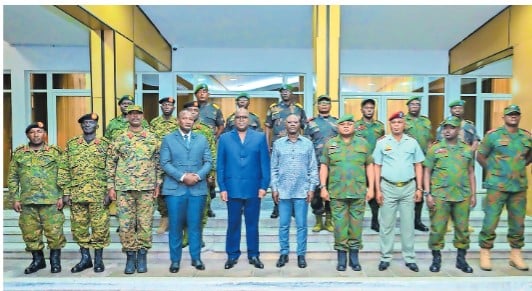Government lacks funds to support new cities, says minister

Finance state minister Henry Musasizi addresses Kigezi leaders in Kabale Town on September 26, 2024. PHOTO/ROBERT MUHEREZA.
What you need to know:
Mr Musasizi says the government’s focus is on reducing expenditure on consumptive items.
State Minister for Finance (General Duties) Henry Musasizi has said the government has no money to fund new cities in the next financial year.
Whereas Finance Minister Matia Kasaija last month said five more new cities will be operationalised in the next financial year, Mr Musasizi instead says the government’s focus is on reducing expenditure on consumptive items.
“These things of [creating] administrative units do not bring us any money; they give us spending pressure on the already constrained resource envelope. Therefore, we are saying some things can wait. If you want to make cities, you wait,” he said.
Mr Musasizi was representing Prime Minister Robinah Nabbanja at the commissioning of the Public Procurement and Disposal of Public Assets (PPDA) building in Mbarara City on Friday.
He was responding to Mbarara City Mayor Robert Mugabe Kakyebezi who had expressed concern over creating more cities when the existing ones are still facing funding challenges and conflicts with their former districts on relocation.
“I still insist that we do not have money to operationalise cities. If you have been keen on following our strategy, our growth agenda has four main areas of emphasis; agro-processing, manufacturing, tourism, and science and technology,” the minister said.
Mr Musasizi said people are obsessed with having cities but they are not utilising their potential in promoting manufacturing and agro-processing.
“In Kabale, there is no factory, and nobody is talking about it. They are talking about a city. Nobody is talking about a factory; our iron ore is hired out. We do not want to talk about it. We have a lot of potential in Irish potatoes and vegetables, but nobody wants to talk about it. They want to talk about giving us a city, we are like others,” he said.
He added: “You join others in poverty and fighting. I am going to carry this position and I am sure, I will succeed. We must put money where it is most needed. If we have made mistakes in the past, we should not repeat them.”
Mr Musasizi believes that cities should be granted in a way of appreciating Ugandans for embracing the growth strategy not at a time when the country is grappling with limited resources.
“We must make sure that we bring all our households into the money economy. We must make sure that this strategy is achieved and once we achieve all that, then we shall make all Ugandans happy by giving them cities. Now those four or five are critical and then we add the facilitating factors,” he said.
Mr Musasizi’s remarks contradict his boss, Mr Kasaija, who last month said they plan to operationalise five more new cities in July 2025.
“The Cabinet and Parliament approved the creation of 15 cities to be operationalised in a phased manner. In the Financial Year (FY) 2020/2021, 10 were operationalised. I now have the honour to announce that we have secured resources to operationalise the remaining cities effective July 1, 2025,” Minister Kasaija is quoted by Daily Monitor as saying at the National Budget Conference in Kampala on September 12.
But Minister Musasizi said the government will communicate the official position about the creation of new cities.
“The government will communicate, as of now, the status quo remains, if there is any change the government has a way of communicating. We shall communicate to the country,” he said.
Background
On July 1, 2020, 10 cities of Mbarara, Fort Portal, Masaka, Arua, Gulu, Jinja, Mbale, Soroti, Hoima, and Lira were operationalised. However, the creation of Kabale, Moroto, Nakasongola, Entebbe, and Wakiso cities was halted. A 2022/ 2023 annual report by the Equal Opportunities Commission (EOC), revealed that eight of the new cities are not fit for purpose. A city must be able to deliver essential services and have adequate capacity for disaster management and waste management, EOC said.
The 10th Parliament on April 28, 2020 approved the creation of 15 cities to become operationalised in a phased manner.




